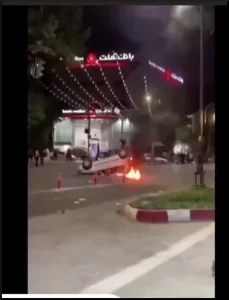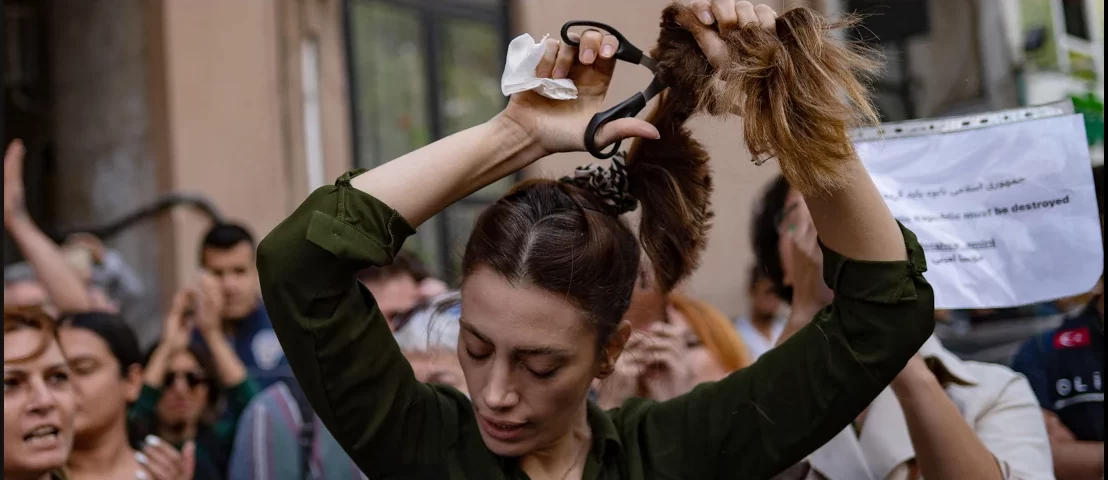Statement from U.S. Peace Council, October 2, 2022
I visited Iran several times a decade ago. Women have it pretty good in Iran. They have about the same ratio of women to men in college as the US (just like us, women do a little better in college and men do a little better in the economy). Women are free to come and go as they please in Iran. But the western press is always ready to ‘jump the shark’ on Iran. Poor people suffer there just as they do here. And, of course, Iran is under sanctions. [jb]
The United States Peace Council is deeply concerned about current events in Iran and the international reaction to them.
As an initial matter, the USPC unequivocally condemns the events which led to the death of Mahsa Amini in the custody of the “Morality Police” for failing to wear a hijab. The USPC supports the right of women in Iran and around the world to make decisions about their own bodies and lives, including decisions about what they wear. No state organization has the right to interfere in such decisions, and no woman should be arrested, interrogated or otherwise abused because of the manner in which she exercises her rights.
At the same time, the USPC is very concerned about how this death is being used by the United States and its allies for nefarious purposes unrelated to a bona fide concern for women’s rights. The Western media — Voice of America, BBC, Deutche Welle, Radio France International, as well as many other imperialist media outlets around the world — have taken advantage of this human tragedy to start a globally coordinated campaign against the government of Iran, which is aimed at discrediting the Iranian government and justifying a forced regime change in that country.

It is ironic that this whole tragedy and the pursuant global media campaign against Iran occurred during the same week that Iran signed the Shanghai Agreement and the Iranian President was scheduled to speak at the United Nations General Assembly. In light of all this, it is clear to the U.S. Peace Council that, as is the modus operandi of the U.S. dating back to its overthrow of the democratically-elected Prime Minister of Iran in 1953, the U.S. government and other Western forces are exploiting a tragedy in Iran to try to push for violent regime change in Iran.
Indeed, we find it extremely hypocritical that the unprecedented concern currently being expressed in the United States for women’s rights issues in Iran follows on the heels of the Supreme Court’s decision in the Dobbs case which overturned decades of precedent establishing the woman’s right to choose whether to terminate her pregnancy — another key decision which only women should have regarding their bodies and lives. In addition, the fact that around nearly 1,000 individuals are killed by police in the U.S. a year, and the fact that between 40 to over 50 of these are women, makes the disproportionate outcry over the tragic fate of an Iranian woman in police custody quite hypocritical.
The important and undeniable fact which people in the U.S. must consider is that the unilateral and illegal economic sanctions being imposed by the U.S. against Iran are killing more girls and women, e.g., through the denial of life-saving medicines, than any acts by Iran’s security forces. Indeed, a number of U.S. officials have already made it clear that it is the very intent of these sanctions to make the Iranian people suffer. Rudolph Giulani recently opined that Iranians begging for food and selling their organs to survive are signs that the sanctions are doing their job. And yet, there has been barely a whisper of protest against these criminal anti-human sanctions.
In fact, these sanctions, which are responsible for much of the Iranian people’s suffering and anger, and have acted as a background for the outburst of different protests, are intentionally aimed at destabilizing the Iranian society through instigating a “velvet revolution” along the lines of the policy proposed by the Brookings Institution in 2009:
[T]he most obvious and palatable method of bringing about its [Iranian government’s] demise would be to help foster a popular revolution along the lines of the “velvet revolutions” that toppled many communist governments in Eastern Europe beginning in 1989. For many proponents of regime change, it seems self-evident that the United States should encourage the Iranian people to take power in their own name, and that this would be the most legitimate method of regime change…[i]
The U.S. Peace Council condemns, in no uncertain terms, all U.S. sanctions against Iran and all efforts of the U.S. to effectuate regime-change in Iran. It is up to the Iranian people, women and men alike, to make their own decisions about the nature of their government and about their own destiny. The U.S. has no right to interfere in such decisions through coercion, whether that coercion comes in the form of sanctions, covert operations, the support of CIA-backed opposition forces, or psychological warfare.
*Featured Image: Nasibe Samsaei, an Iranian woman living in Turkey cuts her ponytail off as a protest in front of the Iranian consulate on September 21 protesting the death of an Iranian woman after her arrest by the ‘morality police’. Yasin Akgul, AFP via Getty Images
________
[i] Kenneth M. Pollack, et. al., “Which Path to Persia? Options for A New American Strategy Toward Iran,” Analysis Paper, Number 20, The Bookings Institution, June 2009, p. 103.
